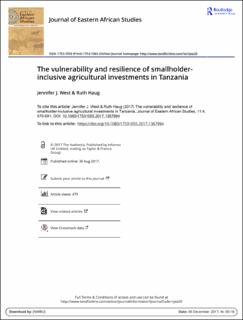The vulnerability and resilience of smallholder-inclusive agricultural investments in Tanzania
Peer reviewed, Journal article
Published version
Permanent lenke
https://hdl.handle.net/11250/2740633Utgivelsesdato
2017Metadata
Vis full innførselSamlinger
- Journal articles [478]
Originalversjon
Journal of Eastern African Studies. 2017, 11 (4), 670-691. 10.1080/17531055.2017.1367994Sammendrag
This paper compares and contrasts two cases of smallholderinclusive agricultural investment in Tanzania and investigates the factors that shape their vulnerability and resilience to risks and uncertainties that influence their performance and viability as a development strategy. Drawing on observations and interviews with smallholders, key informants and management and staff of two large-scale rice and sugarcane estates, we discuss how the division of ownership, voice, risks and rewards in these investments affect how small- and large-scale producers negotiate their relationships in practice, highlighting the role of the state and political economy factors in shaping these dynamics. We find that a lack of transparent and reliable policies and mechanisms for governing access to land, resolving contractual disputes, and marketing the crops in question reinforces power asymmetries between the participants, undermining the potential development impacts of both investments. The two estates moreover appear to enjoy different levels of state protection that render their commercial operations more or less vulnerable and resilient to various political and economic risks. We conclude that smallholder-inclusive agro-investments in Tanzania are unlikely to fulfil both a commercial and a development function in the absence of consistent, transparent and enforceable ‘rules of the game’ that incentivize and reward responsible agricultural investment behaviour.
